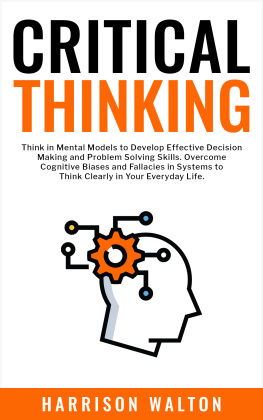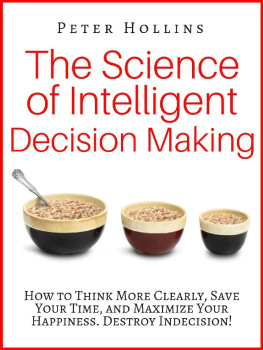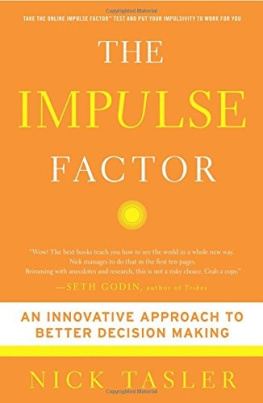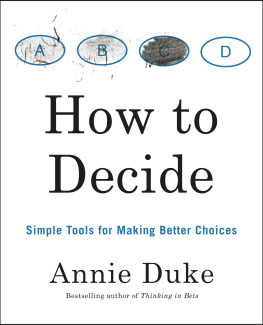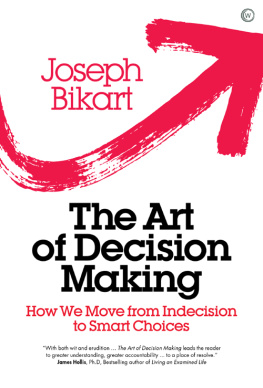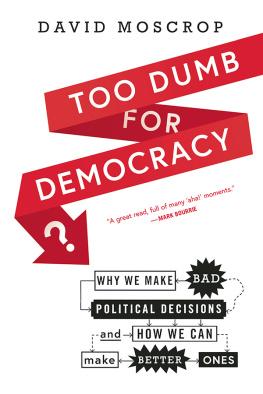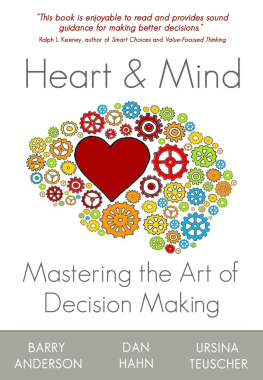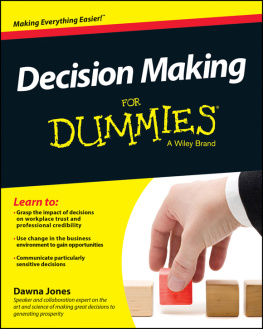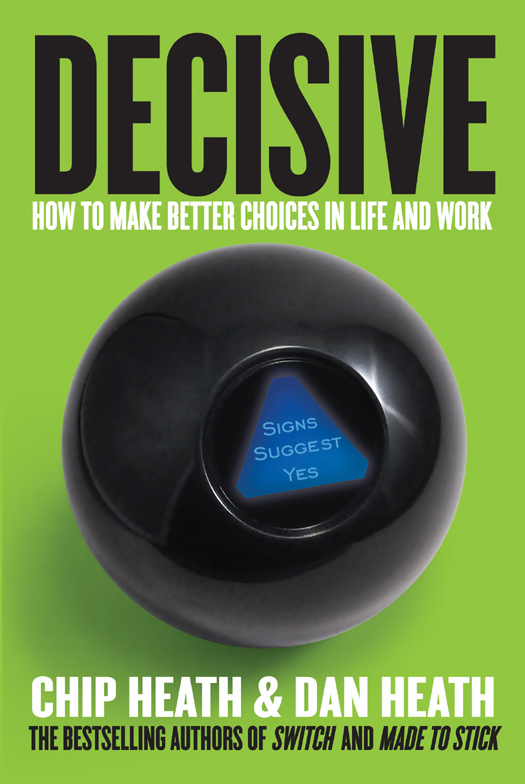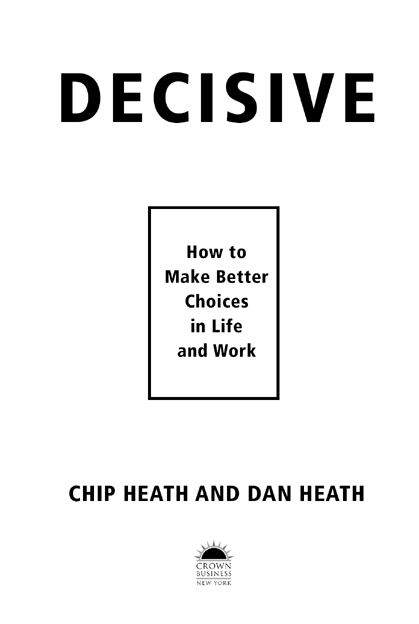ALSO BY CHIP HEATH AND DAN HEATH
Switch
Made to Stick
Copyright 2013 by Chip Heath and Dan Heath
All rights reserved.
Published in the United States by Crown Business, an imprint of the Crown Publishing Group, a division of Random House, Inc., New York. www.crownpublishing.com
CROWN BUSINESS is a trademark and CROWN and the Rising Sun colophon are registered trademarks of Random House, Inc.
Library of Congress Cataloging-in-Publication Data
Heath, Chip.
Decisive / Chip Heath and Dan Heath. 1st ed.
p. cm.
1. Decision making. I. Heath, Dan, 1973 II. Title.
HD30.23.H395 2013
153.83dc23
2012038225
eISBN: 978-0-307-95641-5
Jacket design by Justin Gammon
v3.1
To our wives,
Susan and Amanda,
the best decisions
we ever made
CONTENTS
Introduction
Shannon, the head of a small consulting firm, is agonizing about whether to fire Clive, her IT director. Over the past year, Clive has consistently failed to do more than the minimum required of him. Hes not without his talentshes intelligent and has a knack for improvising cheap solutions to technical problemsbut he rarely takes any initiative. Worse, his attitude is poor. In meetings, he is often critical of other peoples ideas, sometimes caustically so.
Unfortunately, losing Clive would cause problems in the short-term. He understands how to maintain the companys database of clients better than anyone else.
What would you advise her to do? Should she fire him or not?
IF YOU REFLECT ON the past few seconds of your mental activity, whats astonishing is how quickly your opinions started to form. Most of us, reflecting on the Clive situation, feel like we already know enough to start offering advice. Maybe youd advise Shannon to fire Clive, or maybe youd encourage her to give him another chance. But chances are you didnt feel flummoxed.
A remarkable aspect of your mental life is that you are rarely stumped, said Daniel Kahneman, a psychologist who won the Nobel Prize in economics for his research on the way that peoples decisions depart from the strict rationality assumed by economists. In his fascinating book, Thinking, Fast and Slow, he describes the ease with which we draw conclusions: The normal state of your mind is that you have intuitive feelings and opinions about almost everything that comes your way. You like or dislike people long before you know much about them; you trust or distrust strangers without knowing why; you feel that an enterprise is bound to succeed without analyzing it.
Kahneman says that we are quick to jump to conclusions because we give too much weight to the information thats right in front of us, while failing to consider the information thats just offstage. He called this tendency what you see is all there is. In keeping with Kahnemans visual metaphor, well refer to this tendency as a spotlight effect. (Think of the way a spotlight in a theater directs our attention; whats inside the spotlight is crisply illuminated.)
The Clive situation above is an example of the spotlight effect. When were offered information about Clivehe does only the bare minimum, he doesnt take initiative, he has a poor attitude, and his boss might fire himwe find it very easy to take that readily available set of information and start drawing conclusions from it.
But of course a spotlight only lights a spot. Everything outside it is obscured. So, in Clives situation, we dont immediately think to ask a lot of obvious questions. For instance, rather than fire Clive, why not change his role to match up better with his strengths? (After all, hes good at improvising cheap solutions.) Or maybe Clive could be matched with a mentor whod help him set more ambitious goals and deliver less scathing criticism.
Furthermore, what if we dug deeper and discovered that Clives colleagues adore his crusty, straight-talking ways? (Maybe hes the IT version of Dr. House.) And what makes us think that Shannons take on Clive is impeccably accurate? What if she is a terrible manager? When we begin shifting the spotlight from side to side, the situation starts to look very different. We couldnt possibly hope to make a good decision about Clive without doing this spotlight shifting. Yet developing an opinion was easy without doing it.
And that, in essence, is the core difficulty of decision making: Whats in the spotlight will rarely be everything we need to make a good decision, but we wont always remember to shift the light. Sometimes, in fact, well forget theres a spotlight at all, dwelling so long in the tiny circle of light that we forget theres a broader landscape beyond it.
IF YOU STUDY THE kinds of decisions people make and the outcomes of those decisions, youll find that humanity does not have a particularly impressive track record.
Career choices, for instance, are often abandoned or regretted. An American Bar Association survey found that 44% of lawyers would recommend that a young person not pursue a career in law. A study of 20,000 executive searches found that 40% of senior-level hires are pushed out, fail or quit within 18 months. More than half of teachers quit their jobs within four years. In fact, one study in Philadelphia schools found that a teacher was almost two times more likely to drop out than a student.
Business decisions are frequently flawed. One study of corporate mergers and acquisitionssome of the highest-stakes decisions executives makeshowed that 83% failed to create any value for shareholders. When another research team asked 2,207 executives to evaluate decisions in their organizations, 60% of the executives reported that bad decisions were about as frequent as good ones.
On the personal front were not much better. People dont save enough for retirement, and when they do save, they consistently erode their own stock portfolios by buying high and selling low. Young people start relationships with people who are bad for them. Middle-aged people let work interfere with their family lives. The elderly wonder why they didnt take more time to smell the roses when they were younger.
Why do we have such a hard time making good choices? In recent years, many fascinating books and articles have addressed this question, exploring the problems with our decision making. The biases. The irrationality. When it comes to making decisions, its clear that our brains are flawed instruments. But less attention has been paid to another compelling question: Given that were wired to act foolishly sometimes, how can we do better?
Sometimes we are given the advice to trust our guts when we make important decisions. Unfortunately, our guts are full of questionable advice. Consider the Ultimate Red Velvet Cheesecake at the Cheesecake Factory, a truly delicious dessertand one that clocks in at 1,540 calories, which is the equivalent of three McDonalds double cheeseburgers plus a pack of Skittles. This is something that you are supposed to eat after you are finished with your real meal.
The Ultimate Red Velvet Cheesecake is exactly the kind of thing that our guts get excited about. Yet no one would mistake this guidance for wisdom. Certainly no one has ever thoughtfully plotted out a meal plan and concluded, I gotta add more cheesecake.
Nor are our guts any better on big decisions. On October 10, 1975, Liz Taylor and Richard Burton celebrated the happy occasion of their wedding. Taylor was on her sixth marriage, Burton on his third. Samuel Johnson once described a second marriage as the triumph of hope over experience. But given Taylor and Burtons track record their union represented something grander: the triumph of hope over a mountain of empirical evidence. (The marriage lasted 10 months.)



